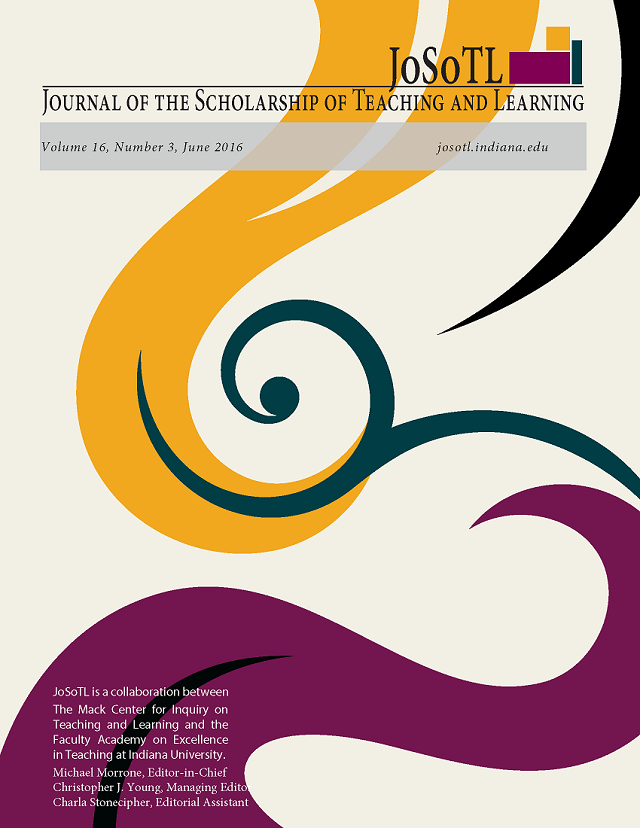A Curricular Intervention for Teaching and Learning: Measurement of Gains of First-Year Student Learning
Main Article Content
Abstract
Downloads
Article Details
- Authors retain copyright and grant the Journal of the Scholarship of Teaching and Learning (JoSoTL) right of first publication with the work simultaneously licensed under a Creative Commons Attribution License, (CC-BY) 4.0 International, allowing others to share the work with proper acknowledgement and citation of the work's authorship and initial publication in the Journal of the Scholarship of Teaching and Learning.
- Authors are able to enter separate, additional contractual agreements for the non-exclusive distribution of the journal's published version of the work (e.g., post it to an institutional repository or publish it in a book), with an acknowledgement of its initial publication in the Journal of the Scholarship of Teaching and Learning.
- In pursuit of manuscripts of the highest quality, multiple opportunities for mentoring, and greater reach and citation of JoSoTL publications, JoSoTL encourages authors to share their drafts to seek feedback from relevant communities unless the manuscript is already under review or in the publication queue after being accepted. In other words, to be eligible for publication in JoSoTL, manuscripts should not be shared publicly (e.g., online), while under review (after being initially submitted, or after being revised and resubmitted for reconsideration), or upon notice of acceptance and before publication. Once published, authors are strongly encouraged to share the published version widely, with an acknowledgement of its initial publication in the Journal of the Scholarship of Teaching and Learning.
References
Ames, C. (1992). Classrooms: Goals, structures, and student motivation. Journal of Educational Psychology, 84(3), 261-271.
Astin, A. W. (1999). Student involvement: A developmental theory for higher education. Journal of College Student Development, 40(5), 518-529.
Bandura, A. & Cervone, D. (1986). Differential engagement of self-reactive influences in cognitive motivation. Organizational Behavior and Human Decision Processes, 38, 92-113.
Bandura, A. (1997). Self-efficacy: The exercise of control. New York: Freeman.
Bean, J. & Eaton, S. B. (2001). The psychology underlying successful retention practices. Journal of College Student Retention, 3(1), 73-89.
Chemers, M. M., Hu, L., & Garcia, B. F. (2001). Academic self-efficacy and first-year college student performance and adjustment. Journal of Educational Psychology, 93(1), 55-64.
Goldfinch, J. & Hughes, M. (2007). Skills, learning styles and success of first-year undergraduates. Active Learning in Higher Education, 8(3), 259-273.
Felder, R. M., Felder, G. N., & Dietz, E. J. (2002). The effects of personality type on engineering student performance and attitudes. Journal of Engineering Education, 91(1), 3-17.
Hallberg, E. H. & Hallberg, K. (2015, May 11). CSFI 2.0 The assessment tool for early identification of “at-risk” students. Retrieved from http://www.cengagesites.com
Kuh, G. & Hu, S. (2001). The effects of student-faculty interaction in the 1990s. The Review of Higher Education, 24(3), 309-332.
Macon, T. H., Shahani, C., Dipboye, R. L., & Phillips, A. P. (1990). College students’ time management: Correlation with academic performance and stress. Journal of Educational Psychology, 82(4), 760-768.
McCarron, G. P. & Inkelas, K. K. (2006). The gap between educational aspirations and attainment for first-generation college students and the role of parental involvement. Journal of College Student Development, 47(5), 534-549.
Micari, M, & Pazos, P. (2012). Connecting to the professor: Impact of the student-faculty relationship in a highly challenging course. College Teaching, 60(2), 41-47.
Padgett, R.D., & Keup, J.R. (2010, November). The impact of first-year seminars on college students’ need of cognition. Paper presented at the 35th Annual Meeting of the Association for the Study of Higher Education, Indianapolis, IN.
Padgett, R. D., & Keup, J. R. (2011). 2009 national survey of first-year seminars: Ongoing efforts to support students in transition. Columbia, SC: National Resource Center for the FirstYear Experience and Students in Transition, University of South Carolina.
Pascarella, E. T. & Terenzini, P. (1979). Student-faculty informal contact and college persistence: A further investigation. The Journal of Educational Research, 72(4), 214-218.
Pritchard, M. E. & Wilson, G. S. (2003). Using emotional and social factors to predict student success. Journal of College Student Development, 44(1), 18-28.
Tinto, V. (1998). Learning communities and the reconstruction of remedial education in higher education. Retrieved from vtinto.expressions.syr.edu
Zhao, C. M. & Kuh, G. (2004). Learning communities and student engagement. Research in Higher Education, 45(2), 115-138.
